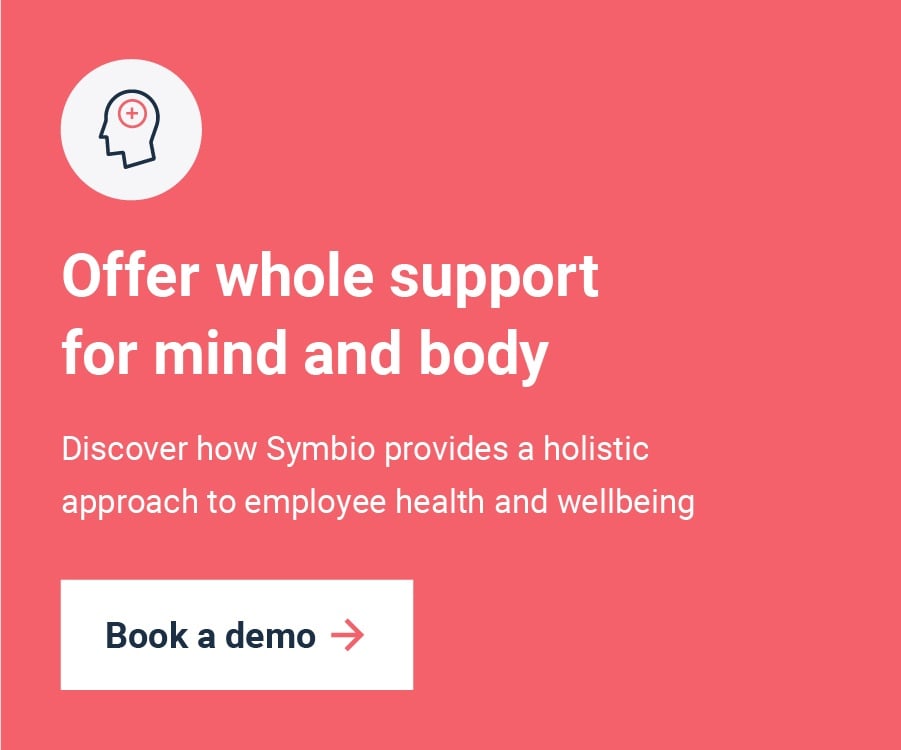Did you know that alcohol causes 17 million sick days in the UK every year?
Many people use alcohol to relax, reduce stress, and ease pressures, but it’s worth noting that excessive drinking can negatively affect wellbeing, physical health, and work productivity.
More importantly, research shows one in five UK adults risk damaging their health by regularly drinking more than the Chief Medical Officers’ low-risk drinking guidelines.
With this in mind, it’s more vital than ever for your organisation to be aware of alcohol misuse and to signpost your staff to appropriate support.
Because you’re in a strong position to engage your team, now is the time to raise awareness and help your workplace establish healthier routines.
You can support your employees and promote awareness by following these eight top tips.
1. Promote responsible drinking
Public awareness of alcohol consumption is changing. However, many people still are unaware that they are drinking over the limit and that it affects their health. Especially considering almost 31 percent of drinkers in the UK are drinking at increasing or high risk levels.
To combat lack of awareness, offer tools for employees to check how much they drink. For instance, tests like the Drink Aware Alcohol Self-Assessment will show them if their drinking puts them at low risk or harm or if they need to take action to reduce the amount they drink. Additionally, apps like MyDrinkaware can monitor alcohol consumption over time, measuring units, calories and sleep quality. Ultimately, this helps employees moderate their drinking, leading to a better mood and a healthier lifestyle.
Want to find out more? Join our Drinkaware webinar
2. Lay out the facts about alcohol
Do you struggle to explain the facts about alcohol alone? Introduce e-learning courses to your wellbeing initiative so employees can learn about the effects of alcohol and its related harm.
More specifically, e-learning provides employees with the essential facts about alcohol. As a result, they will be able to make good decisions regarding their consumption of alcohol. The knowledge they gain can also help reduce the risk of them endangering themselves or others. In addition, e-learning can be integrated with existing Learning Management Systems or hosted by charities such as Drinkaware, which track course progress and scores.
Better yet, you can incorporate these into your health and wellness programs or health and safety training.
3. Train your managers
Did you know that just 12 percent of employers provide training to managers on alcohol misuse? Even more worrying, only 30 percent provide guidelines on how to signpost to support.
Although you may have specific policies, your current training might not be sufficient for managers to deal with workplace alcohol misuse efficiently. It is worth investing in management training and awareness to prevent alcohol-related mishaps in the workplace. After being referred for support, 69 percent of employees continue to work at their organisation.
Some top tips for planning training for line managers include:
- Make clear the crucial role line managers play. Managers are in the best position to spot early warning signs and provide support, but they need the training to feel able to do so effectively.
- Train managers on your alcohol policies. A good start is to remind them of your own alcohol policy and procedures, then provide training that covers: how to avoid developing a drink culture (such as monitoring stress levels and workloads), the problems alcohol can cause, best ways to support individuals with different types of alcohol issues and dealing with disclosure from employees. Managers would not be expected to assume an expert role but raising awareness will play a crucial part in building a supportive culture.
- Cover health and safety considerations. Plan a course of action with managers should an incident occur so that they can contribute to any risk assessments.
- Provide a point of contact. Provide a key HR contact who can offer online resources and support for managers as needed, as well as send them to courses.
- Consider work adjustments. Make line managers aware of how they can provide accommodations for individuals who struggle to get support. For example, flexible working options or role adjustments.
- Review working practices. Assess whether your current practices support staff wellbeing and rethink the nature of work socialising to ensure it is inclusive.
4. Invest in accessible mental health support

Did you know about 1 in 4 people in the UK will experience a mental health problem each year? The relationship between alcohol and mental health is complex.
In fact, alcohol is regarded as ‘the UK’s favourite coping mechanism’, with many drinking to cope with stress, anxiety, depression or other mental health problems.
Some call this ‘self-medicating’ with alcohol. While alcohol can initially relax us and give us a feeling of euphoria, these feelings are short-lived, and the long-term effects of drinking over a prolonged period can be quite harmful:
- Drinking too much alcohol can worsen symptoms of many mental health problems. In particular, it can lead to low mood and anxiety.
- When the immediate calm after drinking fades, some may feel worse than before.
- Post-drinking hangovers can be especially difficult, causing headaches, nausea, and depression.
- Using alcohol in this way can mean that the underlying mental health problems go unaddressed.
Considering this, you should ensure your employee is aware of the top three methods for preventing alcohol problems:
- Employee assistance programme
- Access to occupational health programme
- Access to/signposting to mental health support
If none are available, you may want to refer your employee to a doctor for assessment. An online GP service like HealthHero’s provides fast and convenient access to practising doctors who can provide direct support and advice to your employees. Additionally, we offer online clinically proven counselling and psychological interventions.
5. Don’t encourage a drinking culture
How many of your work social events take place at pubs or bars? 43 percent of working adults agree that there is too much pressure to drink when socialising with colleagues. In fact, those in the private sector are 3.6 times more likely to feel pressured by their managers.
There is no doubt that certain aspects of company culture can influence perceptions about alcohol consumption. So, you should adjust these to reflect the company culture you want to create and that they are evident in your policies.
According to the CIPD, 25 percent of employees say that some people don’t go to social events because of the expectation to drink alcohol. Thus, drinks free events for employees to connect goes beyond being practical. As well as reducing the tendency to meet over a drink, it can align with diversity strategies. For instance, HR could aim to arrange a monthly alcohol free event. Not just for employee wellbeing but also to respect their cultural choices and preferences.
A few suggestions include:
- Moving client meetings away from drinking and ‘happy hour’ to ‘networking’.
- Offering non-alcoholic options and limiting the amount of alcohol your company provides.
- Organising social events without alcohol (this may deter staff from attending, so promote the events to avoid the company culture revolving around alcohol).
Want to learn more? Join us for our webinar
6. Make support a priority in your policies
Go beyond simply improving alcohol education in the workplace. Do your policies prioritise workplace support? Employees will appreciate the fact that your company is supportive of them.
To ensure an effective policy, focus on the following key areas to support alcohol misuse:
- Holistic culture: Promote a workplace culture that values holistic employee health and wellbeing through support outlined earlier.
- Preventative services: Ensure that all preventative measures are covered by your health and benefits plan.
- Alcohol Awareness Programme. To reduce the impact of alcohol-related harm, develop a robust alcohol awareness workplace program. This could include:
- Precise written policies and procedures that define employee and employer responsibilities.
- Education and resources for employees and managers.
- Employee benefits such as healthcare coverage, employee assistance and flexible sick time.
- Support to reintegrate employees during recovery.
7. Host a practical workshop

As we’ve established, many people don’t realise the harmful effects of alcohol on their health and wellbeing.
Hosting alcohol aware workshops, such as sessions on everything employees need to know, can:
- Promote alcohol awareness
- Facilitate a responsible culture
- Build healthy coping strategies
On top of this, expert-led workshops can also positively impact your business. Improving the coping strategies of your employees leads to:
- Fewer sick days and reduced staff turnover.
- Increase employee productivity
- A happier and healthier workforce.
As mentioned earlier, there are training sessions available. Which workshops you host will depend on your size and budget.
That said, make sure any workshop you choose acknowledges the importance of the body and mind. After all, it’s not just decreasing alcohol intake and tracking units that can reduce health risks. Exercise, eating well, and getting plenty of sleep are also essential.
8. Signpost to helpful resources
If you are concerned that an employee has a drinking problem, external help is available. They can find some useful phone numbers and links here for free and confidential advice.
Drinkaware is a charity which aims to reduce alcohol-related harm by helping people make better choices.
Helpline: 0300 123 1110
Free online chat service for anyone who is looking for information or advice about their own, or someone else’s, drinking. Drinkaware trained advisors are on hand to give you confidential advice.
We Are With You (formerly Addaction)
UK-wide treatment agency, helping individuals, families and communities to manage the effects of drug and alcohol misuse. If you are over 50 and have concerns about your drinking, call the helpline.
Helpline: 0808 801 0750
Alcoholics Anonymous (AA) Great Britain
AA supports the recovery and continued sobriety of individuals. Meetings are available online and in person.
Helpline: 0800 917 7650
Al-Anon in the UK and Republic of Ireland offers support to families and friends affected by someone else’s drinking.
Helpline: 0800 008 6811
Information, advice and local support services for families affected by alcohol and drugs.
Helpline: 07442 137 421 or 07552 986 887.
Find out more in our webinar
Alcohol awareness: it’s time to act now
‘It’s more important than ever for organisations to be aware of alcohol misuse and to signpost their staff to appropriate support. Organisations are in a strong position to engage with their staff about alcohol awareness, and now is the time to prioritise employee health and wellbeing.’ – Drinkaware
You can use alcohol awareness as an opportunity to review your substance misuse policies, evaluate your wellness strategy, and support your employees.
Nonetheless, with workplace pressures contributing to increased alcohol consumption, your business must do more. Without effective preventative measures, your employees’ wellbeing, physical health, and productivity will suffer.
Start small by educating employees on the signs of alcohol dependence through e-learning. Then introduce a comprehensive substance abuse prevention programme to bring about real, tangible change. Alternatively, you might consider investing in a virtual healthcare service that combines physical health with mental health. Whatever action you take, put your workers’ health first.
Access our Drinkaware webinar
Are you looking to educate your employees about the impact of alcohol? Do you want to support those harmed by it? Learn how to raise awareness and explore the link with mental health by joining Drinkaware experts in our webinar where you’ll learn how to provide support and expert resources.




-1.jpg?width=800&height=450&name=image%20(19)-1.jpg)
%20(1)-1.jpg?width=800&height=450&name=christina-wocintechchat-com-YCrgxs3e9lY-unsplash%20(1)%20(1)-1.jpg)